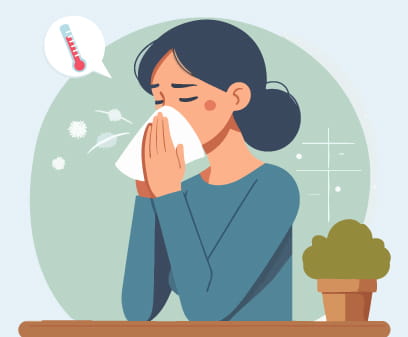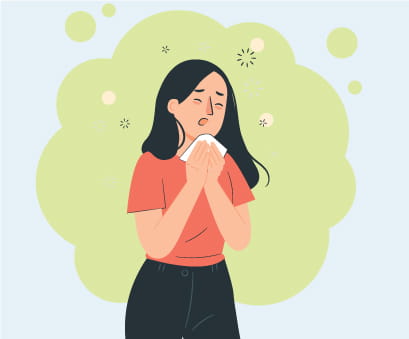What is allergic rhinitis?
An allergen is something that triggers an allergy. Allergic rhinitis, often called hay fever, happens when your nose gets irritated because of an allergic reaction to substances (allergens) like pollen, dust mites, mold, or pet dander. When you have allergic rhinitis, your body reacts to these harmless substances, causing symptoms like sneezing, a runny or stuffy nose, and itchy eyes. This can make life quite uncomfortable and can even lead to asthma in some people.1
The most common trigger for seasonal allergic rhinitis is pollen, which causes an increase in symptoms with the changing seasons.1 Allergic rhinitis is a major health issue affecting more than 400 million people globally.2 It impacts about 30% of people in India.

Difference between allergic rhinitis and common cold
Allergic Rhinitis
.svg?updated=20241115075051)
Itchy eyes
.svg?updated=20241115075057)
Redness in eyes
.svg?updated=20241115075102)
Itchy nose
.svg?updated=20241115075109)
Wheezing
.svg?updated=20241115075116)
Lasts as long as exposed to the trigger

Common cold
.svg?updated=20241115075121)
Sore throat
.svg?updated=20241115075127)
Cough
.svg?updated=20241115075133)
Body Ache
.svg?updated=20241115075139)
Fever
.svg?updated=20241115075144)
Lasts for 3 to 14 days
Triggers for non-allergic rhinitis
Non-allergic rhinitis occurs when blood vessels in the nose expand, leading to swelling, congestion, or excess mucus. The exact cause is unclear, but it can be triggered by various factors such as irritants in the air (like dust or smoke), changes in weather, infections (like colds), certain foods and drinks (like spicy foods or alcohol), some medications (such as aspirin or beta blockers), hormonal changes (like pregnancy or thyroid issues), and sleep-related issues (like lying on your back or acid reflux).6

Classification of allergic rhinitis

Seasonal allergic rhinitis
Seasonal allergic rhinitis means you get symptoms only at certain times of the year. This usually happens if you're allergic to pollen, which is more common during spring and fall. Outdoor allergens such as pollen, trigger these seasonal allergies.

Perennial allergic rhinitis
Perennial allergic rhinitis means you have symptoms all year long. This is more common if you're allergic to substances that are always around, such as dust or smoke. These allergies can occur at any time because of indoor substances such as dust mites and pet dander.1,8

Mixed allergic rhinitis
Sometimes, people have symptoms that don't fit neatly into these categories. For example, someone might have allergies triggered by pollen in cold weather but still bothers them when it gets warm. Others might have multiple seasonal allergies and feel bad all year long, even outside of the typical allergy seasons. So, it’s not always as simple as just seasonal or perennial allergies. Therefore, classifying the allergic rhinitis based on severity and duration of symptoms is important to guide the best treatment for each person.7

Non-allergic Rhinitis
Some people have symptoms like sneezing, congestion, or a runny nose similar to allergies, but they don't actually have allergies. This is called non-allergic rhinitis (NAR). Unlike allergies, where the immune system reacts to allergens, NAR doesn't involve the immune system. It's a condition causing chronic nasal symptoms without allergens.6
Symptoms of allergic rhinitis
Symptoms that occur after you come into contact with the substance you are allergic to may include1:

Itchy and runny nose

Sneezing

Stuffy nose (nasal congestion)

Smelling disturbance

Watery eyes

Coughing
Causes of allergic rhinitis
For most people, allergens are harmless. However, your immune system mistakenly sees these allergens as a danger and releases natural chemicals like histamine into your bloodstream to protect your body.

Flower pollen (more common in spring)

Dust mites

Cat saliva

Grass pollen (more common in summer and fall)

Animal dander (old skin)

Mold
During certain times of the year, pollen from flowers, grasses, and ragweed can be especially problematic. The wind carries their pollen, which can trigger hay fever symptoms.
Hot, dry, windy days usually have more pollen
Cool, damp, rainy days often have less pollen, as it gets washed to the ground9
Risk factors for allergic rhinitis
Anyone can develop allergies, but certain factors increase the chances of developing allergic rhinitis:


Certain external factors can trigger or worsen allergic rhinitis, including:

Cigarette smoke

Cold temperatures

Air pollution

Fumes

Chemicals

Humidity

Hairspray and Perfumes
Understanding these triggers can help manage and reduce the symptoms of allergic rhinitis.1
Allergic rhinitis diagnosis
Your doctor can usually suspect if you have allergic rhinitis by asking about your symptoms and medical history. They will want to know if you've noticed specific things that trigger your symptoms, such as certain places or times.
During the examination, your doctor might also check inside your nose for any unusual growths called nasal polyps. These can develop because of the irritation from allergens. If your doctor isn't sure about what is cause behind your allergic rhinitis, they might send you to a special clinic for allergy testing. There are two main types of tests:

Skin prick test
Your doctor will place a small amount of the suspected allergen on your arm and prick your skin with a needle. If you're allergic, you might get a small, red, itchy bubble like bump where the needle touched.

Blood test (Radioallergosorbent Test)
This test looks for a specific antibody called immunoglobulin E in your blood. Your body produces this antibody when it comes in contact with an allergen.
Managing allergic rhinitis
Several allergy medications are available to reduce symptoms and help you manage allergic rhinitis.
These treatments come in various forms, such as liquids, pills, eye drops, nasal sprays, and injections.
It's important to talk to your healthcare provider before starting any medication, especially if you are pregnant or have other health concerns.
It's crucial to treat allergic rhinitis because, if left untreated, it can lead to complications. Treatment options vary depending on the severity and type of symptoms you experience.

Here are some common treatments your doctor might suggest:
Antihistamines: These medicines block the action of histamine, a chemical released during allergic reactions. They can bring relief within about one hour.
Nasal Sprays:These are useful for depositing medicine directly into your nose with minimal side effects. Corticosteroid nasal sprays are especially helpful for reducing the inflammation and symptoms like congestion.
Eye Drops:These can relieve itchiness and watering in your eyes caused by allergies.
Decongestants:Available as nasal sprays, drops, or oral pills, decongestants can provide short-term relief from stuffiness and sinus pressure by shrinking blood vessels in the nose. However, prolonged use can lead to rebound congestion, so they're best used for short periods.
Nasal Saline Washout:Rinsing your nose with a saltwater solution can help flush out allergens and reduce symptoms.
Mast Cell Stabilizer:These medicines help stop mast cells (these cells contains histamine chemical) from releasing histamine, which can cause allergic symptoms. They are available in the form of nasal sprays and eye drops.
Leukotriene Receptor Blocker:These medicines block the action of leukotrienes, another type of chemical involved in allergic reactions. They reduce symptoms of allergic rhinitis.
Allergy Immunotherapy:In severe cases where other treatments aren't effective, allergy shots may be recommended. These involve receiving small amounts of allergens to help your immune system adjust and provide long-term relief from allergies.11
How to avoid allergens
The best way to manage allergies is to avoid what triggers your symptoms. While it might be hard to avoid all allergens completely, you can take steps to reduce your exposure:

Avoid touching your face, especially avoid rubbing your eyes or nose.

Cover pillows, mattresses, and box springs to shield against dust mites.

Use filters in your vacuum cleaner and air conditioner to reduce allergens in the air.

Wear a hat and sunglasses when outdoors to shield your eyes from pollen.

Keep windows closed at home and in the car when pollen levels are high in the spring, summer, and early fall.

Keep pets off furniture and out of certain rooms by closing doors.

Wash your hands frequently, especially after interacting with pets.

Change your clothes promptly upon returning indoors.5
Consequences of allergic rhinitis
Some complications may arise due to allergic rhinitis. It includes:

Inability to sleep due to symptoms

Frequent sinus infection

Development or worsening of symptoms

Frequent infection of the ears

Irritability

Frequent headaches
If you're experiencing symptoms that are making it hard for you to do your usual activities, it's important to see a doctor right away. They can figure out what's causing your symptoms by performing a proper diagnosis.1
Reference
- Allergic Rhinitis: Symptoms, Treatment, and Home Remedies [Internet]. Healthline. 2015. Available from: Click here
- Alnahas S, Abouammoh N, Althagafi W, Abd-Ellatif EE. Prevalence, severity, and risk factors of allergic rhinitis among schoolchildren in Saudi Arabia: A national cross-sectional study, 2019. World Allergy Organization Journal. 2023 Oct 1;16(10):100824.
- Pocket guide Allergic rhinitis. [Internet]. EUFOREA. 2024. Available from Click here
- Jaggi V, Dalal A, Ramesh BR, Tikkiwal S, Chaudhry A, Kothari N, Lopez M, Gogtay J. Coexistence of allergic rhinitis and asthma in Indian patients: The CARAS survey. Lung India. 2019 Sep 1;36(5):411-6.
- Allergic Rhinitis (Hay Fever): Symptoms, Diagnosis & Treatment [Internet]. Cleveland Clinic. Available from: Click here
- Nonallergic rhinitis. Disease & Condition. [Internet]. Mayoclinic. 2024. Available from Click here
- Small P, Keith PK, Kim H. Allergic rhinitis. Allergy, asthma & clinical immunology. 2018 Sep;14:1-1.
- Allergic Rhinitis [Internet]. MSD MANUAL Professional Version. 2022. Available from: Click here
- Allergic rhinitis. Medical Encyclopedia. MedlinePlus. 2022. [Internet]. Available from Click here
- Allergic rhinitis [Internet]. NHS inform. [cited 2024 Feb 28]. Available from: Click here
- Hay fever - Diagnosis and treatment - Mayo Clinic [Internet]. www.mayoclinic.org. Available from: Click here
- Pennmedicine.org. 2024 [cited 2024 Feb 28]. Available from: Click here
- Hagemann J, Onorato GL, Jutel M, et al. Allergy. 2021;76(8):2354-2366. Is It a Common Cold or Allergies? WebMD. Available at: Click here